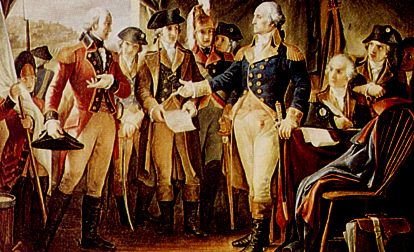
Have you ever wondered how the Revolutionary War is taught in England? Last night I did a little research on the Internet and came upon several message boards where Americans and Brits were discussing this topic. The general consensus that I gathered is that they do not discuss the Revolution in the UK. At first glance this sounds preposterous, but we have to remember that England’s history goes back centuries before ours even started. As a result, what was THE seminal event in our nation’s history is just another footnote in theirs. A student from Oxford University posted that on the rare occasion it is discussed, they refer to it as “The War of Independence.” He added that his history classes dealt with British social-history (how the Elizabethans, Romans, Victorians lived) in Primary school (11-) and 20th-Century political history (Nazi Germany, Cold War) between ages 11 -18. The only “American history” he remembered learning about was the Civil Rights Movement.
One graduate student from London posted that the American Revolution was briefly discussed during his education, but in an impartial manner which differed greatly from our romanticized version. He added that many of the “myths” surrounding the event were more readily dispelled in his classrooms. The example offered up was the Boston Tea Party. According to his teachers the protest took place because taxes were too low, not too high (some readers may be surprised to know that taxes were far higher in England than they were in the colonies). In addition he was told that King George III had little power over the colonists meaning the rebellion was actually against the policies of the British Parliament and Prime Minister, not the King.
Another disparity between the US and UK versions was how the war was lost. As British forces were the best equipped and trained army on the planet, it seems impossible that a band of citizen soldiers could defeat them. One UK student said he was taught that the war had ended because British troops were needed elsewhere, not that they were defeated by the Continental Army. Another confessed he was told that the army had simply quit when it became too difficult for them to maintain a supply line across the ocean. I found it very interesting that none of the Brits taking part in this conversation countered either of these claims. (It reminded me very much of the debates I’ve witnessed over the Civil War when folks argue whether the Confederate Army was defeated by the Federals or simply collapsed due to logistics.)
The biggest difference when comparing the US and UK versions appears to be whether the colonists were better off as a result of gaining their independence. According to the UK posts, life without England was dramatically worse for many, especially African-Americans as the British Empire abolished slavery in 1805, 60 years before the Emancipation Proclamation. Their theory being that the slave trade would have been eradicated much sooner if the colonies had remained under British rule. Additionally they believe that if America had waited a few more years, the British North America Acts would have likely permitted them to have their own elected Parliament, just like Canada.
In the end most of the UK students participating in the discussion agreed that they had been taught very little or nothing at all about the Revolution. Fewer cared until they got older and began to take an interest in world history. So what have we learned? Obviously there are two sides to every war, each with a different perspective and recollection. The Revolutionary War (or War for Independence depending on which side of the ocean you’re on), is of particular significance as it resulted in the birth of a new country. It is the quintessential example of “David slaying Goliath.” We Americans celebrate the event, while Englishmen tend to ignore it.
I wonder if the Israelites and Philistines did the same?
Updated: Saturday, 2 April 2011 2:15 PM EDT
Permalink | Share This Post





